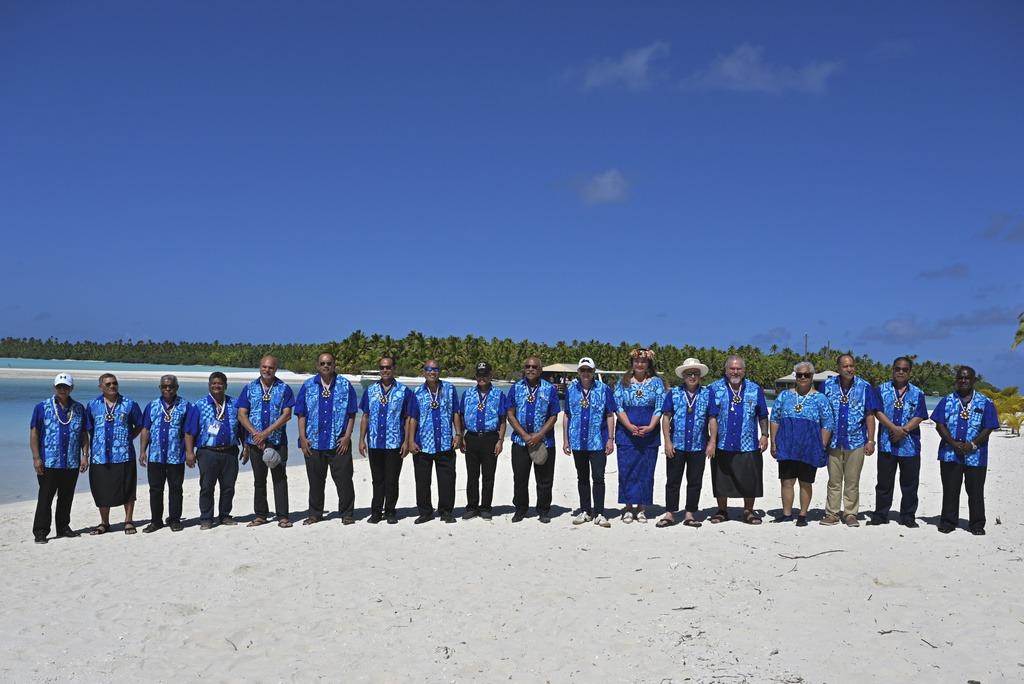 Pacific leaders pose for a group photograph on One Foot Island after attending the Leaders' Retreat during the Pacific Islands Forum at Aitutaki, Cook Islands, Nov 9, 2023. (PHOTO / AP)
Pacific leaders pose for a group photograph on One Foot Island after attending the Leaders' Retreat during the Pacific Islands Forum at Aitutaki, Cook Islands, Nov 9, 2023. (PHOTO / AP)
Pacific Island leaders have stressed the need to grasp their own destiny by setting their own regional agenda, with a focus on climate change and nuclear issues.
Leaders and delegates of member nations this month gathered together on the Cook Islands for the 52nd Pacific Islands Forum under the theme "Our Voices, Our Choices, Our Pacific Way: Promote, Partner, Prosper".
Founded in 1971, the forum is the region's premier political and economic policy organization that comprises 18 members.
Before the summit, Cook Islands Prime Minister Mark Brown, also chairman of the forum, said it is important that "we control the narrative as Pacific countries, setting our own destiny".
Yu Lei, a professor at Shandong University's School of Northeast Asian Studies, said the emphasis on regional self-determination and autonomy is a response to the region's history and current situation.
"Historically, as the Pacific Island nations were former colonies, they have striven for authentic political self-determination and economic self-reliance following their independence," Yu said.
"Currently, they are facing increasing geopolitical issues that affect the region. With geopolitical issues threatening to overshadow their own concerns, the region now has a stronger desire to control its regional agenda."
For Pacific Islanders, climate change, economic development and political stability are their biggest concerns, with climate change considered their top priority, Yu said.
According to the UN, every year, at least 50,000 islanders in the Pacific are at risk of being displaced by the impact of disasters and climate change. Rising sea levels caused by the climate crisis threaten to make low-lying island nations inhabitable.
"However, the West has shown a lack of urgency to deal with the climate crisis and tried to make security issues dominate the regional agenda and politicize economic cooperation, leaving the Pacific Island nations' core interests in the dark," Yu said.
At the UN General Assembly held in September, island nations said the failure of developed countries had put their survival at risk.
At a September summit, US President Joe Biden promised Pacific nation leaders to provide about $200 million in funding for the island chains. This is on top of last year's summit where more than $7.2 billion was pledged. However, much of that pledged money remains undelivered.
US' credibility eroded
Niu Li, executive director of the Beijing Foreign Studies University's Center for Pacific Studies, said the United States has a tradition of signing blank checks for aid to the Pacific Island nations, adding that failing to deliver its promises has eroded its credibility in the region.
Nuclear-related issues were also discussed during the forum. "The island nations are facing three major nuclear-related issues, including Australia's AUKUS submarine deal, Japan's discharge of nuclear-contaminated water into the sea and the nuclear testing legacy issues of the US," Chen Xiaochen, executive deputy director of the Centre for Asia Pacific Studies at East China Normal University in Shanghai, said.
Regarding the issue of Japan's discharge of nuclear-contaminated water into the sea, leaders called to establish political dialogue annually to ascertain safety issues and emphasized the need to build national and regional scientific capacity and monitoring capabilities to assist the wellbeing of the marine ecosystems of the Blue Pacific, according to the communique issued after the forum.
"From the communique, we can see the leaders' attitude toward the US on nuclear-related issues is quite tough, urging the US to take solid measures to address the legacy issues of nuclear testing, nuclear waste and other issues," Chen said. "The communique also reflects the Pacific Islanders' opposition to Japan's discharge of toxic water. There have been many protests and demonstrations against this in many countries in the region."


